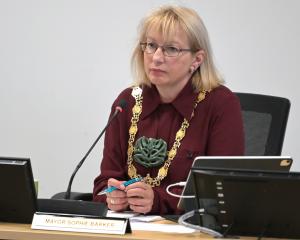
The Minister for Infrastructure and Regional Economic Development had arrived in the city from Southland, where he and Acting Prime Minister Winston Peters had urged the region to speed up their applications for cash from the Regional Growth Fund.
This is a $1 billion-a-year fund, aimed purely at encouraging regional growth.
Southland has yet to see any of the money.
Mr Jones promised one thing — irrespective of the pace Southland moves at, every cent put aside in the coalition agreement, equalling $3 billion, will be committed by the next election.
And on he came to Dunedin, where he confirmed the Government will contribute $820,000 from the growth fund to pay for a feasibility study and business case for the ambitious waterfront project.
He also endorsed a memorandum of understanding signed by key players supporting the project, including the Dunedin City Council, the University of Otago, Port Otago and Ngai Tahu.
Damien van Brandenburg, of Architecture Van Brandenburg, and businessman Ian Taylor, who floated the waterfront concept, are also signatories to the agreement, which commits all parties to work together to progress the project.
The Otago Regional Council did not sign the agreement because of its regulatory responsibilities, but says it remains a staunch supporter.
According to Mr Jones, the waterfront vision will be "transformational" for the city and unparalleled in scale in New Zealand.
Without doubt, the waterfront project will indeed transform the city and the Government funding for the feasibility study and business case is an important step forward.
There have been concerns raised about the cost of the project and who will pay. It is now important the study is carried out without delay. First, the proponents of the scheme need to allay ratepayer fears about wasted money and, secondly, there is a chance more money is available from the Government if the project stacks up.
Pledges from developers will be an important step.
This project will not be carried out within a year or two. It will be a long complex development, which like the new Dunedin Hospital, will create many jobs for the city. The vision for the waterfront can be a mainstay of keeping young people in the city rather than see them scurrying off once their education has finished. Generations of parents have been asking for just this — a way to keep their families intact in Dunedin.
Of course the jobs will not keep everyone in the city but, as Ian Taylor can attest, high-tech, high pay and a secure future can satisfy the most talented of graduates, enough to keep them here, making Dunedin the vibrant city many wish it can be.
Importantly, Mr Jones also realises the future does not just lie in the waterfront.
He met with those behind the proposed engineering hub, saying if he did anything else it will be to back the hub concept and build on the city’s engineering legacy.
Another $60,000 from the growth fund will pay for the development of an Otago-wide economic development strategy, something unlikely to get total agreement from region’s leaders.
Earlier in the week, an Infometrics report identified the country’s provincial economies are poised to drive growth in the economy. However, that provincial growth will not be sufficient to prevent New Zealand’s economy cooling during 2019.
New Zealand First was founded 25 years ago this week on concerns by Mr Peters about neglect of the regions, and the treatment of older people in the community.
Dunedin perhaps has to now accept it is a region, rather than a major metropolitan centre, given the money Mr Jones, a NZ First MP, is prepared to allocate to local projects.
Swallowing some pride on the city’s place is a small price to pay for nearly $1 million of support and the prospect of more to come.












